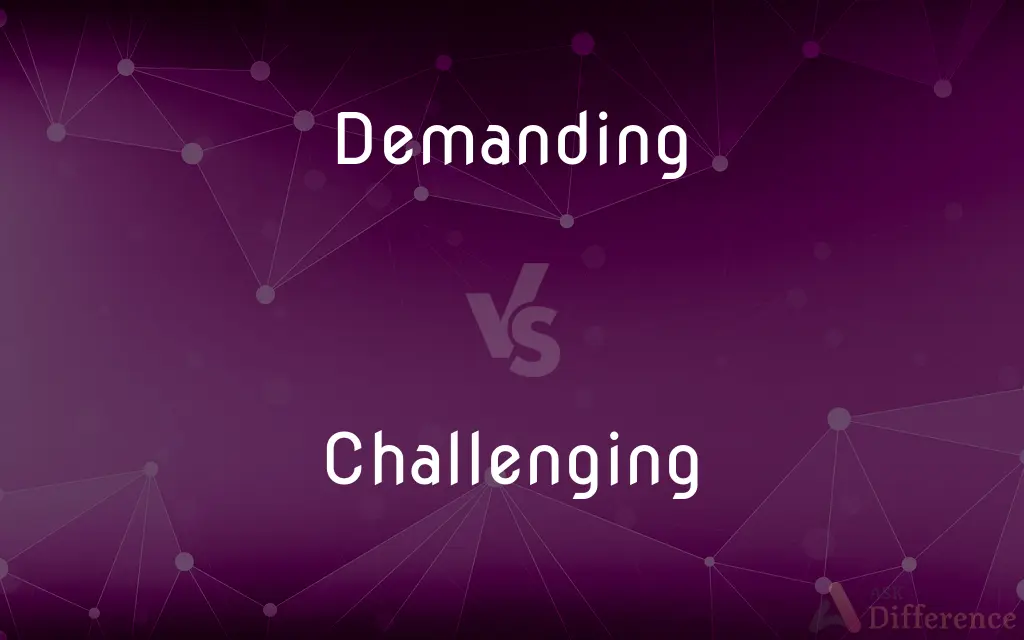Demanding vs. Challenging — What's the Difference?
By Tayyaba Rehman & Urooj Arif — Updated on April 27, 2024
Demanding tasks require constant attention and effort, whereas challenging tasks involve complexity that tests abilities.

Difference Between Demanding and Challenging
Table of Contents
ADVERTISEMENT
Key Differences
Demanding tasks often necessitate a high level of sustained effort and commitment from an individual. In contrast, challenging tasks may require creative thinking and problem-solving skills to overcome.
A demanding job typically involves a heavy workload and tight deadlines, placing continuous pressure on an individual. On the other hand, a challenging job might offer varied problems that stimulate intellectual or physical skills.
Demanding situations are usually seen as taxing and exhausting due to their nature of requiring more than what might seem reasonable. Whereas, challenging situations are often viewed positively as they provide opportunities for growth and learning.
In education, demanding courses might require extensive reading, multiple assignments, and strict adherence to guidelines. Challenging courses, however, might focus more on the depth of understanding required and the application of knowledge in new and innovative ways.
In personal development, a demanding task could feel overwhelming and possibly lead to burnout if not managed well. Conversely, a challenging task, while difficult, often brings a sense of achievement and satisfaction once completed.
ADVERTISEMENT
Comparison Chart
Effort Required
High and constant
High but varies
Nature
Often repetitive and exhaustive
Involves novelty and variety
Perception
Can be negative
Generally positive
Outcome
Possible burnout
Growth and satisfaction
Skill Utilization
May not require new skills
Often requires new skills
Compare with Definitions
Demanding
Requiring a high level of ability or effort.
Medical school is known for being exceptionally demanding.
Challenging
Presenting difficulties that encourage growth.
The new role was challenging, pushing her beyond her comfort zones.
Demanding
Exacting in one's requirements.
The demanding boss was never fully satisfied with the work.
Challenging
Difficult in a way that is usually interesting or enjoyable.
He found teaching a challenging but rewarding job.
Demanding
Insisting on high standards.
Her demanding nature ensured that every detail was perfect.
Challenging
Requiring full use of one's abilities or resources.
The steep mountain trail was challenging for beginner hikers.
Demanding
Requiring much time, effort, or attention.
The demanding project required team members to work late hours.
Challenging
Inviting competition or demanding skill.
The challenging puzzle took hours to complete.
Demanding
Hard to please or satisfy.
The critics were demanding, expecting perfection in every performance.
Challenging
Stimulating, interesting, and thought-provoking.
The book presents challenging ideas about societal norms.
Demanding
Requiring much effort or attention
Exhausted by a demanding job.
Challenging
Requiring the full application of one's abilities, attention, or resources
A challenging role for an inexperienced performer.
A challenging homework assignment.
Demanding
Requiring others to work hard or meet high expectations
A demanding teacher.
Challenging
Present participle of challenge
Demanding
Requiring much endurance, strength, or patience.
Challenging
Difficult, hard to do.
Demanding
Present participle of demand
Challenging
The act of making a challenge.
Demanding
Requiring more than usually expected or thought due; especially great patience and effort and skill;
Found the job very demanding
A baby can be so demanding
Challenging
Requiring full use of one's abilities or resources; as, challenging task.
Challenging
Disposed to or engaged in defiance of established authority.
Challenging
Requiring full use of your abilities or resources;
Ambitious schedule
Performed the most challenging task without a mistake
Challenging
Stimulating interest or thought;
A challenging hypothesis
A thought-provoking book
Challenging
Disturbingly provocative;
An intriguing smile
Common Curiosities
Is a demanding task always negative?
Not necessarily, but demanding tasks can become negative if they lead to excessive stress or burnout.
What makes a task demanding?
A task is demanding if it requires constant effort and a high level of commitment.
Can a job be both demanding and challenging?
Yes, many jobs can be both demanding in their workload and challenging in the skills they require.
How do challenging tasks differ from demanding ones?
Challenging tasks involve complexities that test and develop one’s abilities, unlike the often exhaustive nature of demanding tasks.
Can demanding situations affect personal relationships?
Yes, demanding situations can strain personal relationships if they consume a significant amount of time and energy, leaving less for social interactions and family commitments.
What are the benefits of tackling challenging tasks?
Challenging tasks can lead to personal growth, learning, and satisfaction from overcoming difficulties.
How can one manage the stress of demanding tasks?
Effective stress management techniques, such as time management, delegation, and taking regular breaks, can help cope with the pressures of demanding tasks.
What skills are typically developed through challenging tasks?
Challenging tasks often help develop problem-solving skills, creativity, resilience, and adaptability by pushing individuals beyond their comfort zones.
Why might someone prefer a challenging job over a demanding one?
Many people prefer challenging jobs because they offer opportunities for growth and the reward of overcoming obstacles, which can be more fulfilling than the constant pressure associated with demanding jobs.
How do employers view demanding and challenging roles?
Employers often value challenging roles for their potential to drive innovation and personal development, while demanding roles are recognized for their high productivity requirements but may require careful management to prevent employee burnout.
Share Your Discovery

Previous Comparison
Circle vs. Encircle
Next Comparison
Shamisen vs. BiwaAuthor Spotlight
Written by
Tayyaba RehmanTayyaba Rehman is a distinguished writer, currently serving as a primary contributor to askdifference.com. As a researcher in semantics and etymology, Tayyaba's passion for the complexity of languages and their distinctions has found a perfect home on the platform. Tayyaba delves into the intricacies of language, distinguishing between commonly confused words and phrases, thereby providing clarity for readers worldwide.
Co-written by
Urooj ArifUrooj is a skilled content writer at Ask Difference, known for her exceptional ability to simplify complex topics into engaging and informative content. With a passion for research and a flair for clear, concise writing, she consistently delivers articles that resonate with our diverse audience.















































